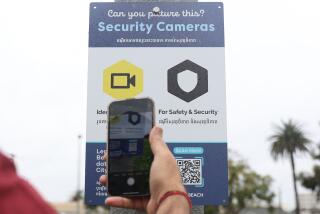Alleged Google Glass attack victim accused of recording neighbors
SAN FRANCISCO -- Sarah Slocum, the social media consultant who said she was attacked for wearing Google Glass in a San Francisco bar, was accused two years ago by neighbors of surreptitiously recording them with her smartphone, according to court documents.
The revelation could fan tensions over the new wearable technology as Google prepares to begin selling the device to the public.
In an interview with The Times, Jessie Lilley Campbell said she was sitting with her husband and their landlord in the living room of their Aptos, Calif., home on the evening of May 15, 2012, when she noticed that someone was holding up a smartphone to record the conversation through an open window.
PHOTOS: Top smartphones of 2013
Campbell said she opened the front door and spotted Slocum, who at the time lived in a cabin on the property. She confronted Slocum, who denied recording the conversation.
The next morning, Campbell filed for a restraining order. Campbell said Slocum later admitted in court she recorded the conversation but said Campbell had no expectation of privacy.
A judge granted the restraining order, which prevented Slocum from coming close enough to Campbellâs home to record conversations.
Reached by telephone, Slocum, 34, said she did not want to discuss the details of Campbellâs allegations. She said the incident in Santa Cruz County two years ago was âunrelatedâ to the incident at a San Francisco bar last month.
âAnything I recorded them doing, it was recorded in a legal spot,â she said of Campbell and her husband, adding, âI didnât do anything wrong in the past with those people.â
Slocum also vigorously denied surreptitiously recording anyone with Google Glass at Molotovâs, a dive bar on Haight Street in San Francisco.
One witness told a local television station some in the crowd were âjust rather insulted that someone thinks itâs OK to record them the entire time theyâre in public.â
âThere was no surreptitious recording going on at the bar that night,â Slocum said. âI didnât surreptitiously record anyone. I only started recording after they threatened me. And I told them the second I started recording them.â
Slocum was wearing Google Glass when she entered Molotovâs at 1:30 a.m. on Feb. 21.
Some patrons were excited to see Glass, but others were not. One woman at the bar flipped Slocum off and a man yanked the glasses from her face and ran off with them. Slocum later got her pair of Glass back, but she said someone stole her purse and other belongings.
Slocum posted a video of part of the incident that she recorded with Google Glass on YouTube. On it, the woman who flipped her off tells Slocum: âYouâre killing the city.â
The woman, who was an off-duty bartender at Molotovâs, told the New Yorker magazine Slocum started recording her and refused to stop when she asked. Slocum said she did not recall being asked to stop recording.
On Twitter, Slocum said: âIf you donât want to be recorded, you donât go flipping someone off with a camera and calling them names #letsgetreal #moronicâ
The confrontation over Glass drew headlines from around the world, leading to a heated debate over the privacy implications of Glass.
Slocum gave interviews to news outlets around the country and suggested on Twitter that Google sponsor her trip to the SXSW conference âso I can formally continue to help educate the public about @googleglass.â
About 10,000 people â- including Slocum -- are testing a prototype of the wearable computing device. That has made some people apprehensive that Glass will film them unawares.
Even privacy experts say people are overreacting to Glass, which performs many of the same functions, including taking photographs and recording video, that a smartphone does.
A Glass wearer must speak a command or touch the device to start taking photographs or recording video. Glass then lights up, making it apparent that it is recording. The Glass wearer has to look directly at someone to take a photo or video of them.
âIf you want to surreptitiously record someone, there are much better things than Glass,â University of Washington law professor Ryan Calo said. âThe reason that this is elevated to a national conversation is precisely because we are moving from handheld to wearable devices, and this is part of the growing pains we are seeing around that.â
ALSO:
Clash over Google Glass shows hurdles facing wearable tech Woman saying she was attacked in bar wonât stop wearing Google Glass
Woman wearing Google Glass in San Francisco bar says she was attacked






